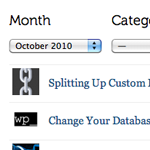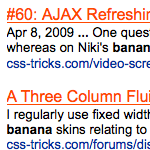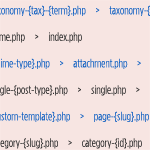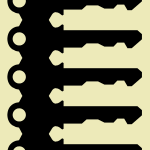Yearly archives: 2010
Awesome WordPress Plugins to Empower Your Visitors
If you’re looking for some great plugins to bring more interactivity and user participation to your WordPress-powered site, check out my guest-post over at ProBlogger – it covers Google Search, Star Ratings, Favorite Posts, and other techniques to empower your visitors.

Dynamic Archives
Have you ever seen WordPress archives where you select something (usually a month/year) from a dropdown and it takes you to a page where you can view that? It’s fairly common. WordPress almost has built in functionality for it, since you can specifically tell the wp_get_archives() function that you want the values to be returned as <option></option>s. We can kick it up a notch though, and make the results show dynamically on the same page as the dropdowns through some Ajaxy JavaScript. We’ll even allow for multiple dropdowns (include the category as well) and make sure it’s flexible for your own alterations.
Splitting Up Custom Field Values
I’ve worked on sites in the past where I needed to get two values out of a custom field. For example, I was creating an eCommerce site where some products had options. The options were in a dropdown menu. Each option in the dropdown had a value for what you actually see, and then another value for how that option effected the price. When entering a custom field, I often did it like this:

Change Your Database Prefix to Improve Security
One of the awesome things about WordPress is that it’s a dynamic publishing system that uses a database to store your site’s information: posts, options, plugin and theme settings – all of this data is stored in your site’s database. It’s like the brain of your WordPress installation.
Unfortunately the WordPress database is also a prime target in many website attacks. Spammers and other bad guys target various database tables with automated scripts, SQL injection, and other malicious code. Needless to say it’s critical to protect your database and keep recent backups. One of the smartest ways to protect your site’s database is to change the default table prefix to something obscure and difficult to guess. Sort of like a password.

Customize Your WordPress Dashboard
There are many ways to customize the WordPress Dashboard. Over the years, the Dashboard has evolved into a highly flexible information portal, enabling an overall, big-picture view of the main components of your site, while also providing granular data on everything from recent comments and plugin updates to incoming links and WordPress news. And that’s just the default functionality, there are also a ton of dashboard widgets and plugins available in the WordPress Plugin Directory that you can use to transform your Dashboard into just about anything, or even disable it completely.

Using Google Custom Search in WordPress
Once a WordPress powered site starts getting quite a bit of content, the default built-in search becomes fairly useless. It just isn’t very smart. If you wrote a comprehensive article about He-Man, but since have written five other articles that just mentioned He-Man in passing, a search for “He-Man” will turn up your comprehensive article sixth. There have been various tweaks and plugins and whatnot that attempt to improve upon this default functionality. But why not leverage the best search engine ever written instead?

DiW v3.0 Printed Books!
We’re now accepting orders for printed copies of Digging Into WordPress version 3.0. The books currently are finishing up at the printers, and should be ready to ship within the next week or so. From what we’ve seen so far, the finished books are looking incredible. To give you a taste, here are a few shots of the newly printed books featuring the new dark/black cover and black coil binding:
WordPress Snippets
New WordPress-only snippets repository. Nice clean design, good functionality, quality content (like this gem). This one should be a winner.

Speed Up Your Blogging with WordPress Shortcodes
Shortcodes are WordPress’ way of creating shortcuts for code snippets, strings of text, or anything else that you need to display on your site. So this means that you can save time by replacing your most commonly typed words and phrases with WordPress shortcodes. For example, if you are frequently typing your blog’s URL, you could place the following code your theme’s functions.php:
Custom Tweet Button for WordPress
Nicolas Gallagher:
How to create a custom Tweet Button for WordPress using the bit.ly and Twitter APIs. The HTML and CSS is completely customisable and there is no need for JavaScript. PHP is used to automatically shorten and cache the URL of a post, fetch and cache the number of retweets, and populate the query string parameters in the link to Twitter.

WordPress 3 Template Hierarchy
This chart is one entire page in our book, but I thought it would be good to focus on specifically. Template hierarchy has gotten a bit more advanced since the last time we covered it.
The idea is that WordPress will look for files in a theme to use to render the current page in a specific order. For example, let say you have a page for showing posts from a certain category like this. On this site, all our category pages are currently the same and use “archive.php” template. This file is pretty far down the hierarchy, and is shared with other types of views, for example, tag and category pages.

WordPress Security Keys
In our recent post on pimping the wp-config.php file, we explain that using strong Security Keys is an important part of securing your WordPress installation. In this post, we want to zoom-in on Security Keys and look at what they are, how they work, and how to use them to greatly improve the security of your site.
URL Sentences in WordPress
WPCandy is back under Ryan Imel and it’s been loaded with good stuff lately, including this great run-through of how to use Chris Shiflett’s URL sentences idea in WordPress.
digwp.com/thinks/this-is-a-cool-idea
404 Link Removed

Version 3.0 Launch!
It’s here! Digging Into WordPress Version 3.0 is here and it’s packed with lots of awesome WordPress goodness, including an entire new chapter on WordPress 3, plus lots of updated core content, and a super-sleek new cover that I think is a huge improvement. You’ve got to check out the book’s sweet dark/black cover, expertly crafted by Chris:







